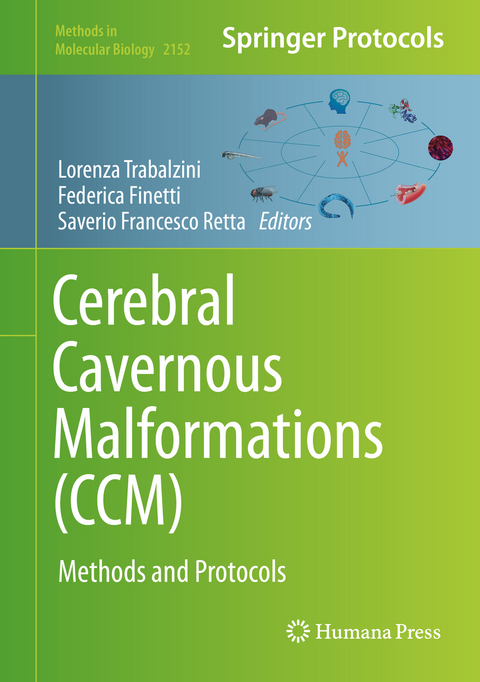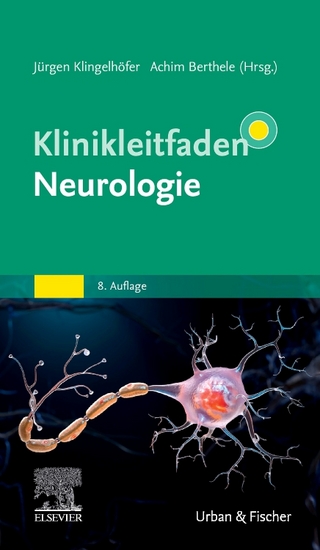
Cerebral Cavernous Malformations (CCM)
Springer-Verlag New York Inc.
978-1-0716-0639-1 (ISBN)
Authoritative and cutting-edge, Cerebral Cavernous Malformations (CCM): Methods and Protocols aims to ensure successful results in the further study of this complex disease and its pathophysiologic correlates.
From Genes and Mechanisms to Molecular-targeted Therapies: the Long Climb to the Cure of Cerebral Cavernous Malformation (CCM) Disease.- Incidence, Prevalence, and Clinical Presentation of Cerebral Cavernous Malformations.- Natural History, Clinical, and Surgical Management of Cavernous Malformations.- Molecular Genetics Screening of CCM patients, An Overview.- Next Generation Sequecing (NGS) Strategies for Genetic Testing and Diagnosis of Cerebral Cavernous Malformation (CCM) Disease.- Genome-wide Genotyping of Cerebral Cavernous Malformation Type 1 Individuals to Identify Genetic Modifiers of Disease Severity.- Clinical Imaging of Cerebral Cavernous Malformations: Computed Tomography and Magnetic Resonance Imaging.- Neuroradiology: Differential Diagnosis, Follow-Up, and Reporting.- Surgical Management of Brain Cavernous Malformations.- Generation of CCM Phenotype by a Human Microvascular Endothelial Model.- Isolation and Purification of Mouse Brain Endothelial Cells to Study Cerebral Cavernous Malformation Disease.- Production of KRIT1-knockout and KRIT1-knockin Mouse Embryonic Fibroblasts as Cellular Models of CCM Disease.- CRISPR/Cas9-mediated Generation of Human Endothelial Cell Knockout Models of CCM Disease.- Dissection of the Role of CCM Genes in Tubulogenesis using the Drosophila Tracheal System as a Model.- Generation and Analysis of CCM Phenotypes in C. elegans.- Generation of Transgenic Lines of Zebrafish Expressing Fluorescently-tagged CCM Proteins to Study Their Function and Subcellular Localization within the Vasculature.- Vertebrate Models to Investigate CCM Pathogenesis: The Zebrafish and Mouse Model.- Generation of Cerebral Cavernous Malformation in Neonatal Mouse Models using Inducible Cre-LoxP Strategy.- Isolation of Cerebral Endothelial Cells from CCM1/KRIT1 Null Mouse Brain.- Identification of the KRIT1 Protein by LexA-based Yeast Two-Hybrid System.- Crystallographic Studies of the Cerebral Cavernous Malformations Proteins.- Microscopy Techniques to Investigate CCM Pathogenesis.- Preparation and Analysis of Protein Extracts to Investigate CCM Pathogenesis.- Systems Wide Analysis of CCM Signaling Complex (CSC) Alterations in CCM Deficient Models using Omics Approaches.- Study of Molecular Interactions of CCM Proteins by using a GAL4-based Yeast Two-hybrid Screening.- Study of CCM Microvascular Endothelial Phenotype by an in vitro Tubule Differentiation Model.- Bidimentional in vitro Angiogenic Assays to Study CCM Pathogenesis: Endothelial Cell Proliferation and Migration.- Measurement of Endothelial Barrier Function in Mouse Models of Cerebral Cavernous Malformations using Intravital Microscopy.- Immunofluorescence of Cell-Cell and Cell-Extracellular Matrix Adhesive Defects in in vitro Endothelial CCM Model. Juxtacrine Role of Mutant Extracellular Matrix on Wild-Type Endothelial Cells.- Detection of p62/SQSTM1Aggregates in Cellular Models of CCM Disease by Immunofluorescence.- Notch Signaling in Familial Cerebral Cavernous Malformations and Immunohistochemical Detection of cleaved Notch1 Intracellular Domain.- Measuring the Kinase Activity of GCKIII Proteins in vitro.- Spectrophotometric Method for Determining Glyoxalase 1 Activity in Cerebral Cavernous Malformation (CCM) Disease.- Fluorescence Analysis of Reactive Oxygen Species (ROS) in Cellular Models of Cerebral Cavernous Malformation Disease.- Small RNA Library Preparation for Profiling Small Non-coding RNAs in Patients Affected by Cavernous Malformations.- Affinity Purification and Preparation of Peptides for Mass Spectrometry from C. elegans.
| Erscheinungsdatum | 30.06.2020 |
|---|---|
| Reihe/Serie | Methods in Molecular Biology ; 2152 |
| Zusatzinfo | 62 Illustrations, color; 24 Illustrations, black and white; XV, 496 p. 86 illus., 62 illus. in color. |
| Verlagsort | New York, NY |
| Sprache | englisch |
| Maße | 178 x 254 mm |
| Themenwelt | Medizin / Pharmazie ► Medizinische Fachgebiete ► Neurologie |
| Medizin / Pharmazie ► Studium | |
| Naturwissenschaften ► Biologie ► Genetik / Molekularbiologie | |
| Schlagworte | CRISPR • Immunohystochemical techniques • Oxidative stress • SNPs analysis • Zebrafish |
| ISBN-10 | 1-0716-0639-5 / 1071606395 |
| ISBN-13 | 978-1-0716-0639-1 / 9781071606391 |
| Zustand | Neuware |
| Haben Sie eine Frage zum Produkt? |
aus dem Bereich


